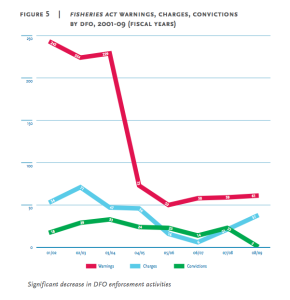When governments do little to enforce environmental laws, generally or in particular areas, private citizens and environmental groups sometimes try to fill the gaps with private prosecutions. These cases are burdensome and expensive to handle, but can make a significant difference, as Ecojustice’s light pollution case did to make mirrored buildings safer for birds. But should private citizens really have to enforce the central provisions of the Fisheries Act?
Two years ago, Ecojustice warned of declining Fisheries Act enforcement. Now, Marilyn Burgoon has received approval from the BC Provincial Court to lay Fisheries Act charges against the provincial government and a fuel company. In July of 2013, a tanker truck carrying fuel for helicopters working in the Slocan Valley fighting forest fires overturned on a small forest service road and spilled 30,000 L of fuel directly into a creek. The trucker was working for the province. For unexplained reasons, the province did not bring any charges.
In a private prosecution, the proposed prosecutor must obtain permission from a court to have a summons issued to the proposed defendants. In this case, the provincial government adamantly opposed the issuance of a summons to themselves.
The Province conceded that depositing tens of thousands of litres of jet fuel into a pristine creek inhabited by fish was a violation of s. 36(3) of the Fisheries Act. and that there was a prima facie case against the fuel company, Executive Flight Centre. They argued that no summons should be issued to the Province, however, because the Province did not directly deposit the fuel in the waterway. The court disagreed, concluding at paragraph 19:
The offence in question under the Fisheries Act is a strict liability offence. The evidence establishes that the Province retained Executive Flight Centre to provide the deleterious substance, the jet fuel, to its operations in the Slocan Valley. The evidence also shows that it was the Province who chose the areas which were to be the staging area to which the fuel was to be delivered. It was the Province who was responsible for having the deleterious substance brought into the wilderness.
The court issued summons against both Executive Flight Centre and the Province of British Columbia.
It seems likely that, at this point, the Attorney General of British Columbia will take over the prosecution. The Crown Counsel Policy Manual states that: “Generally, Branch policy does not permit a private prosecution to proceed. Crown Counsel will usually take conduct of the prosecution or direct a stay of proceedings after making a charge assessment decision.”
This means that the province has the complete right to prevent all the charges from going ahead, including the charges against itself that it has already publicly opposed. But will they be too embarrassed to do it?
If the prosecution (by either the AG or Ms. Burgoon) proceeds and results in a conviction, Ms. Burgoon could be entitled to half the amount of the fine imposed (see s. 62(1) of Fishery (General) Regulations). Given that the minimum fine for large corporations convicted of contravening s. 36(3) is $100,000 on a first offence, ($25,000 for a small corporation) this could be substantial.

